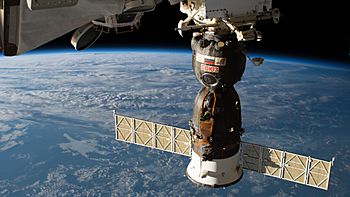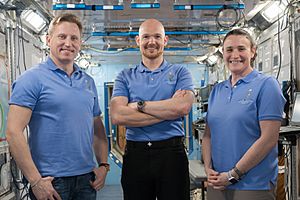Soyuz MS-09 facts for kids
Soyuz MS-09 was a special space mission that launched on June 6, 2018. It carried three astronauts to the International Space Station (ISS). This flight, known as MS-09, was the 138th journey for a Soyuz spacecraft. The crew included a Russian commander, an American flight engineer, and a German flight engineer. The mission successfully ended on December 20, 2018.
 |
|
| Operator | Roskosmos |
|---|---|
| Mission duration | 196d 17h 50m |
| Spacecraft properties | |
| Spacecraft type | Soyuz-MS 11F747 |
| Manufacturer | RKK Energia |
| Crew | |
| Crew size | 3 |
| Members | Sergey V. Prokopyev Alexander Gerst Serena M. Auñón-Chancellor |
| Callsign | Altai |
| Start of mission | |
| Launch date | 6 June 2018 11:12:41 UTC |
| Rocket | Soyuz-FG |
| Launch site | Baikonur Pad 1/5 |
| End of mission | |
| Landing date | 20 December 2018 05:02 UTC |
| Landing site | Kazakh Steppe |
| Orbital parameters | |
| Reference system | Geocentric |
| Regime | Low Earth |
| Docking with ISS | |
| Docking port | Rassvet nadir |
| Docking date | 8 June 2018 13:01 UTC |
| Undocking date | 20 December 2018 01:42 UTC |
| Time docked | 194d 12h 41m |
 (l-r) Prokopyev, Gerst and Auñón-Chancellor Soyuz programme
(Crewed missions) |
|
Contents
Who Was on the Soyuz MS-09 Crew?
The Soyuz MS-09 mission carried three astronauts. They were part of the Expedition 56 and Expedition 57 crews on the ISS.
Main Crew Members
| Position | Crew member | |
|---|---|---|
| Commander | Expedition 56 First spaceflight |
|
| Flight Engineer 1 | Expedition 56 Second spaceflight |
|
| Flight Engineer 2 | Expedition 56 First spaceflight |
|
Backup Crew Members
These astronauts were ready to fly if the main crew could not.
| Position | Crew member | |
|---|---|---|
| Commander | ||
| Flight Engineer 1 | ||
| Flight Engineer 2 | ||
What Happened with the Air Leak?
On August 29, 2018, ground control noticed a small air leak on the ISS. They found a tiny 2 mm hole in the orbital module of the Soyuz spacecraft.
How Was the Leak Fixed?
Russian crew members first used special Kapton tape to temporarily seal the hole. Later, they used a repair kit with an epoxy sealant for a permanent fix. By August 31, the leak was completely sealed, and the air pressure was normal.
Investigation into the Hole
On September 4, 2018, officials announced that the hole was made by a drill. It was not clear if this was an accident or done on purpose. Russian officials thought it might have been an act of sabotage, possibly during the spacecraft's manufacturing. Some even wondered if one of the NASA crew members had drilled the hole.
On December 11, 2018, astronauts Kononenko and Prokopyev performed a spacewalk (called an EVA). They cut through outer layers of the spacecraft to examine the hole from the outside. They took pictures and collected samples to help with the investigation.
Impact on the Mission
The hole was in the orbital module, which is a part of the spacecraft that separates and burns up in Earth's atmosphere before the crew returns home. This meant the hole did not put the astronauts' return flight in danger. The return of the MS-09 crew was delayed for a short time because of a problem with another mission, Soyuz MS-10. The MS-09 crew landed safely on December 20, 2018.
Later, Prokopyev said that the drill hole was made from the inside. However, it is still not clear when it was made. In September 2019, the head of Roscosmos, Dmitry Rogozin, said that his agency knew exactly what happened but would keep the information secret.
Images for kids
-
Oleg Kononenko on a spacewalk to examine the external hull.
See also
 In Spanish: Soyuz MS-09 para niños
In Spanish: Soyuz MS-09 para niños
 | James B. Knighten |
 | Azellia White |
 | Willa Brown |




